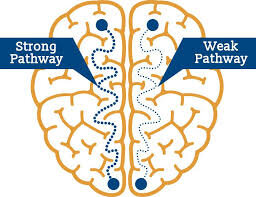Dr. Chris Introduces You to the Value of Good Habits
When we hear the word habit, our first reaction is often a bad habit like nicotine, drug addiction or alcohol abuse. We may even think of nail biting or onychophagia. However, thankfully we all have habits that are good for us and make our life easier to navigate. Imagine if you had to think about everything you did. You wouldn’t get much accomplished during the day.
THINKING BRAIN
Habits Defined
So how do we define a habit? Webster defines habit as an acquired mode of behavior that has become nearly or completely involuntary. Fortunately, we have a multitude of daily habits that are nearly or completely voluntarily. You brush your teeth in the morning and at the same time think about what is on your agenda that day. The repetitive movement of the brush across your teeth and gums is not something you are probably consciously thinking about.
Habit Loops
In his book the Power of Habits, Charles Duhigg does a nice job of describing the three elements of the habit loop. We have a cue, a routine or behavior and then a reward. If you understand this pattern, have an intention to change, and are persistent you can develop many positive or good habits. If you use this neurology to your advantage, this simple loop can be the precursor to tremendous success in your life.
The Habit Loop
Habit loops always start with a cue. This trigger stimulates some predetermined action on the part of your brain. We call his automaticity. This results in a mental, physical or emotional action which is followed by some reward. The reward or reinforcer thus stimulates the brain to remember and retain this loop. The trigger and the reinforcer or reward outcome become neurologically intertwined. A pathway in your brain is strengthened, and with repetition the brain pathway becomes stronger.
BRAIN PATHWAYS
Repetition and Practice Develop Habits
Repetition and practice result in habits (good or bad). Let’s consider the importance of increasing a good habit or exercise into our daily routine. We can all agree that exercise is good for you. In fact, most experts agree that getting more exercise even once a week is good for you. Exercise builds heart strength and helps lower your risk of cardiovascular disease. Blood sugar, blood pressure and fat in your blood are all improved by exercise.
When you get home from work and go to your bedroom to change your walking or running shoes are placed in an obvious spot where you take of your clothes. Those workout shoes are a trigger or cue that sets off the loop.
RUNNING SHOES AS A TRIGGER
You look at your Fitbit Charge 3 or Apple Watch (another trigger) and notice you have only walked 5,401 steps that day, or well short of your 10,000-step goal. Since you have an intention to exercise and get in your 10,000 steps a day, you put the shoes on and leave your house. You start walking about your neighborhood on a usual path you have taken before (Behavior). You feel good about yourself as you are keeping your commitment to better health (reward).
The Reward Strengthens Habits
After several loops around your neighborhood the fitness product on your wrist vibrates, stars go off and you are greeted with a congratulatory message. You have achieved your 10,000-step goal (Reward).
What is also powerful is that you can stack habits upon one another. In the example above, which really represents a habit loop of mine, I engage in another positive behavior while walking. I listen on my wireless headphones to educational courses, TED Talks or informative YouTube videos while I walk about my neighborhood.
Walking is a trigger (cue) for the behavior of learning which has the reward of being able to share more information with my clients or help me develop personally. Stacking habits can be powerful and extremely helpful to us in our personal or career lives.
In future blog articles, we will discuss ways in which habits can improve the quality of your life. Knowing how to use the power of your brain to create a better you are powerful and can improve your self-esteem and quality of life.
If you would like a mentor to assist you to develop more positive habits consider a FREE 20-minute consultation.
LEARN HOW BELIEFS AFFECT HABIT CHANGE IN JACKSONVILLE
OR
LEARN MORE ABOUT HEALTHY CHANGE IN JACKSONVILLE HERE
References
The Power of Habit by Charles Duhigg". Financial Times. Retrieved 2019-03-22.





